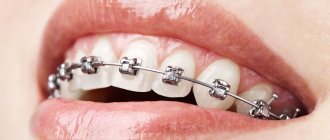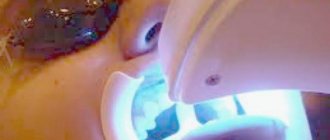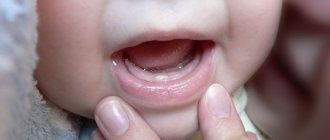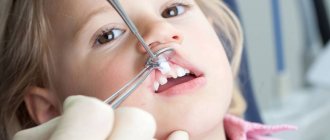When teeth start cutting
There is no exact answer as to what time a child’s teeth are cut – the timing varies from person to person. However, you can focus on the average, standard periods of eruption approved by WHO:
- the lower incisors appear at 6–7 months;
- upper – at 7–8 months;
- upper lateral incisors – at 8–9 months;
- the lower ones are closer to a year.
According to the standard, a one-year-old child must have eight baby teeth.
From one year to one and a half years, the child acquires larger teeth - upper and lower molars, and from fifteen to twenty months - upper canines, which are also called “ocular.” The fact is that the optic nerve runs next to them, so these teeth are often more difficult for the child than others. Irritation of the nerve causes sharp pain and sometimes watery eyes.
It can be difficult even for a doctor to understand that the first teeth are being cut. After all, this process is often accompanied by an increase in temperature, changes in stool and mood, and refusal to eat.
At what age should you worry if your child doesn't start talking?
Let us remind you once again: each child is an individual with his own individual characteristics. The age at which each stage of speech development occurs varies greatly among different children. If the baby said his first words a month or two later than normal, it’s okay. You can talk about a possible problem only if the baby is behind by a stage or more:
Why doesn't the child pronounce his first words?
If a child shows signs of speech delay, a medical problem must first be looked for. In addition to conditions associated with abnormalities of brain development (cerebral palsy, autism and others), these may be hearing impairment and physical defects of the speech apparatus - the larynx, vocal folds, pharynx, jaw muscles.
If they are ruled out, it is most likely a temporary psychological problem. The baby will outgrow it with the help of a speech development specialist. And then the parents will dream about something else - how to silence him 
When does a child start speaking if the family speaks two languages?
If a child is in a bilingual environment from birth, he will begin to speak later than his peers. But in both languages at once! The reason is obvious: the baby has to figure out on his own why adults pronounce certain sounds during different actions, and if they call one thing in two words, it is much more difficult to understand the mechanics of “speaking.”
It is not at all necessary that mom and dad speak different languages. The source of alternative linguistic knowledge can be a grandmother, a nanny, or older children in a nursery. If you want your child to know two languages from infancy, just be patient while waiting for the first words. But if your plans do not include teaching your baby the nanny’s native language or the grandmother’s special dialect, ask them to speak in the clearest Russian possible in the presence of the baby.
The baby learned his first words. What's next?
Speech is the basis of communication, which means that enormous opportunities open up for you to communicate with your child and teach him. Explain, tell, answer questions. And don’t forget in any case: it is important not only to talk, but also to listen, recognizing and taking into account the needs of the little person.
Formation of the dentition
The article tells how to understand that a child is teething, and about ways to help him with pain and inflammation of the gums. But first, a few words about the process of dentition formation.
The formation of absolutely all teeth occurs in the fifth month of intrauterine development. They remain in a “frozen” state and begin to grow immediately before eruption. Therefore, if a child has no teeth by 9-12 months, radiography is prescribed - a study that allows one to evaluate their formation and location.
What is the revitalization complex in psychology?
The revival complex is a manifestation of motor activity and expression of emotions by a child when a significant adult appears within the reach and visibility of him. The baby reacts to its parents from about the third week of life. Physiologists believe that with the emergence of the revitalization complex, the baby enters a new stage of life - infancy.
Children are born with a basic set of reflexes, and over time, developing new ways of responding to external events, they adapt to unfamiliar living conditions. Psychologists express the opinion that the baby’s initial adaptation to society is successful if he is in the 3rd week:
- able to focus attention on people, objects, sounds;
- freezes when parents or adult relatives appear;
- responds with a smile to kind words;
- can express joy with enthusiastic sounds.
What affects the timing of teething?
Processes in the body are individual, including timing. The age at which the first teeth appear is determined by a number of factors:
- Heredity.
- The intrauterine period and negative factors affecting the fetus (for example, a pregnant woman taking certain medications).
- Nutrition for the expectant mother during the period of waiting for the baby and breastfeeding.
Introduction of complementary foods, etc.
Stages of the revitalization complex
If parents have created a favorable psychological environment for the baby at home, then the revitalization complex will appear in a timely manner. A favorable environment is considered:
- harmonious alternation of silence and peace with moments of active wakefulness;
- a sufficient amount of attention and affection;
- exclusion of severe psycho-emotional shock in the first month of life.
If your baby doesn't react to a colorful rattle, don't get upset ahead of time. You need to be patient, because in just a couple of weeks your heir will appreciate all the toys. Through the revitalization complex, the baby tells you that he is ready to explore the world around him.
The complex of emotional revival occurs in several stages:
- New reactions appear, which psychologists call the revival complex (freezing, focusing on the adult’s face and voice, smiling, enthusiastic screaming, physical activity).
- The baby begins to distinguish the voices of others and recognizes the mother's voice.
- About two weeks after the end of the newborn period (this period lasts from the first day of life until the appearance of the revitalization complex), the child focuses his attention on attractive colorful objects and can track movement with his eyes.
- At the beginning of the third month of life, the baby reacts emotionally not only to the mother’s appearance and voice, but also to touch and to the feeding process. When mom is nearby, the baby is calm and happy.
- By the end of the third month of life, the child’s behavior takes on more complex forms; during this period he is already able to distinguish loved ones from strangers.
If the baby is in good conditions and psychologically develops in accordance with the norms, then at 4-5 months the revitalization complex will already include the first skills of self-regulation, that is, the baby will learn to control his mood.
Teething symptoms
- there may be a slight fever;
- anxiety - the child becomes capricious, sleeps poorly, often wakes up at night;
- decreased appetite;
- excessive salivation and, as a result, redness of the skin around the mouth;
- swelling and redness at the site of tooth eruption, possible formation of hematomas on the gum mucosa;
- increased need for the baby to chew on something: pacifier, toys, fingers.
There are children whose teeth appear asymptomatically and even unnoticed by their parents. But, as a rule, this process is accompanied by an individual combination of the signs given in the list above.
How to help your child say his first words faster?
Speech is closely related to intelligence, so many parents try to get their baby talking quickly and are very worried if he doesn’t want to do this. Today there are many methods for early speech development. You can choose and try one of them, but just don't overdo it. Sometimes too intense exercises have side effects - the child may withdraw into himself from information overload or stop being interested in the world around him, wanting to learn new words only from his favorite educational cartoons. To understand whether a developmental program is causing harm, carefully monitor your child’s behavior and emotional state, and regularly consult with a specialist.
In addition to the author’s methods, there are also universal tips that help parents hear the baby’s first words faster:
- Do not think that your baby will speak faster if you artificially reduce communication with him to the most primitive words. On the contrary, from birth, try to talk with your child on a variety of topics, even abstract ones.
- If your baby is not sleeping, talk to him constantly. Comment on your actions while playing, feeding or changing clothes. While walking, talk about everything you see - trees and flowers, roads and cars, rain and sun, butterflies and birds. Describe each item - what it does, what color it is, size, quantity, what it consists of, etc. If it is connected with something already familiar to the baby, point out this connection.
- Do not fix simplified forms of words in your child’s mind. If your child calls the cat “ko,” confirm that you understand him and say correctly: “yes, that’s a cat.” And, of course, do not invent such words yourself.
- When children begin to speak, it is important to give them opportunities to gain fresh knowledge. Do not limit yourself to the vicious circle of “house, park, playground.” Take your baby to children's events, the zoo, museums and other places where he can get new experiences.
- Read books to your child, show pictures and explain what is shown in them, sing children's songs, look for videos for children on the Internet. All this stimulates the baby’s interest in mastering speech, expands vocabulary and builds logical connections between various objects, actions, phenomena, and properties.
- Praise your child for his achievements. Even if they are very tiny.
Maximum activity
We have found that the baby gradually masters the skills of communicating with close adults, and this ability will be the main activity of the first half of life.
Psychologists say that the revitalization complex directly depends on the level of satisfaction of a small child’s needs for emotional communication. The peak manifestation of the revitalization complex is the baby’s age from 3 to 4 months, after which it transforms into more complex forms of behavior, therefore it is during this period that parents are recommended to accompany all their actions with verbal comments.
What happens to the child after the emotions of revival?
The revitalization complex in psychology is the beginning of a new stage in the development of an infant, whose task is to understand the surrounding world.
After the revival complex appears, the baby:
- feels the need to move;
- seeks to interact with adults;
- psychologically well;
- responds with a reaction to a visual and/or auditory stimulus.











